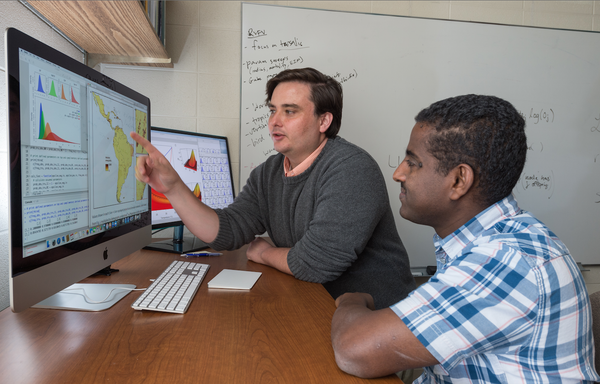Bad news for humans about the spread of mosquito-borne disease as climate change continues to worsen. New research from the University of Notre Dame, recently published in PLOS Neglected Tropical Diseases, proposes a new way that climate change could contribute to mosquitos’ capacity to drive disease epidemics. As climate change continues to rise, so could the speed of epidemics of mosquito-borne diseases like dengue and Zika.
“Our results show that the sensitivity of mosquito-borne diseases to temperature could translate into faster spread of mosquito-borne diseases as temperatures increase,” said Alex Perkins, PhD, Eck Family Assistant Professor in the Department of Biological Sciences, a member of the Eck Institute for Global Health and the Environmental Change Initiative. “Our work shows that not only might more people become infected but that those people could become infected in a shorter period of time. That’s a big concern because of the strain it puts on healthcare systems.”

This research was specific to dengue virus transmission by Aedes aegypti mosquitoes. However, the results indicate that other viruses carried by this mosquito, such as chikungunya and Zika, might also be impacted under future climate change. Perkins notes, “the results imply that temperature has the potential to shape multiple aspects of mosquito-borne disease dynamics and that climate change could have complex effects on the epidemiology of these diseases.”
Perkins is among the nation’s leading researchers in a unique and growing area within this complex field of disease control and prevention. The Perkins Lab at the University of Notre Dame applies mathematical modeling to the study of infectious disease transmission dynamics and control with a focus on mosquito-borne diseases including, but not limited to, Zika, dengue, and malaria. Included in this project also from Notre Dame are Amir Siraj, Rachel Oidtman, both also in the Department of Biological Sciences, and John Huber from the Department of Applied and Computational Mathematics and Statistics, in addition to Moritz Kraemer from the University of Oxford, Olivia Brady from The London School of Hygiene & Tropical Medicine, and Michael Johansson from both the US Centers for Disease Control and Prevention and the Harvard Chan School of Public Health.
While there is a future threat of dengue to the United States, currently the greatest threat is in the tropics and subtropics where the disease is already prevalent. “Sometimes the intense nature of dengue epidemics has been known to overwhelm healthcare systems and elevate the risk to patients left without adequate medical treatment,” notes Perkins.
Funding to the respective partners for this research was provided by a RAPID award on Zika research from the National Science Foundation, The Branco Weiss Fellowship, National Institute of Child Health and Human Development, the National Library of Medicine of the National Institutes of Health, and grant support from both Janssen Sciences and the Models of Infectious Disease Agent Study program.
About:
The Eck Institute for Global Health recognizes health as a fundamental human right and endeavors to promote research, training, and service to advance health standards for all people, especially people in low-and middle-income countries, who are disproportionately impacted by preventable diseases.
The Environmental Change Initiative works to provide research solutions to society’s complex environmental challenges that minimize the trade-offs between human welfare and environmental health.
The University of Notre Dame is a private research and teaching university inspired by its Catholic mission. Located in South Bend, Indiana, its researchers are advancing human understanding through research, scholarship, education, and creative endeavor in order to be a repository for knowledge and a powerful means for doing good in the world.
Photo: Dr. Alex Perkins with Dr. Amir Siraj (post doctorate in the Perkins Lab at the University of Notre Dame)
Contact: Alex Perkins at 574-631-7179, taperkins@nd.edu